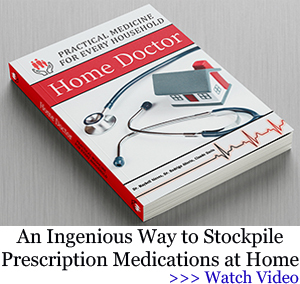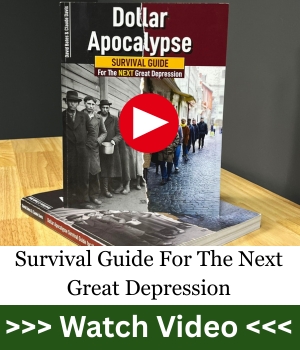In the likely case of a disaster situation, one of the first problems survivors will encounter is the lack of supplies. All shops, including drugstores will be emptied within hours of the confirmed crisis. Lack of transportation, anarchy and panic will definitely not help in getting new supplies. Hospitals will be full and doctors won’t be able to deal with all those who need help – so the best thing you can do is be prepared to help yourself!
Medication, especially over the counter drugs, are one of the things we take for granted. I mean, it’s so easy! – just walk a couple of blocks and buy it. Well, things might change sooner than you expect, and suddenly something as basic as Tylenol could worth more than its weight in gold. But prescription drugs would be much, much more valuable – they will be actual lifesavers, drawing the line between life and death.
Going to a local store and purchasing 2 racks of drugs is not wise, nor useful. You need to make a list of the drugs you and your family use most often. If it’s the case, you can also make a list of chronic conditions you and your family have. Suddenly running out of insulin if you’re a type I diabetic is not what you want.
According to how often these drugs are used in the average household, here’s a list of substances that should always be available.
Over The Counter Drugs
- Ibuprofen. This is the active compund of drugs like Motrin or Advil. It’s an anti-inflammatory medication that is indicated for pain and inflammation and it also relieves fever. In the right dosage it can be used safely in adults as well as in children who are 3 months or older. It comes in pills and as a suspension, and if you have kids it would be advisable to stock both. Long-term use and high doses can be agressive to the stomach, so if you have ulcer you should keep away from it for as long as possible. Combined with acetaminophen it’s effectiveness increases as a painkiller, making it comparable to codeine or tramadol.
- Acetaminophen. This is known as Tylenol and it’s the only pain-reliever that is not an anti-inflammatory drug, so it is much more gentle to your stomach. It’s available in dosages for children and adults and is safe to use even in babies younger than 3 months. It also effectively fights fever, however its effect as pain-reliever is milder than that of Ibuprofen, according to some users.
- Loperamide. Commonly known as Imodium, this is the most effective over the counter drug against diarrhea. Make sure to store it both in children and adult versions.
- Rehydration electrolytes. They are especially useful for young children, because they are prone to severe dehydration once vomiting or diarrhea kicks in.
- Ranitidine. This is more widely known as Zantac and it’s a great antacid. It is used in treating ulcer and gastritis as well as simple heartburn. It is commonly prescribed to be used along with ibuprofen, in people who have a sensitive stomach.
- Bacitracin ointment. This is a cream that contains a small dose of a highly effective antibiotic, meant to treat superficial skin lesions and fight possible infection. It’s not enough for a deep wound, that usually requires oral antibiotherapy, but it will work great for abrasions, insect bites or impetigo.
- Acetylsalicylic acid. This is commonly known as Aspirin, and you must be aware of the fact that it should never be used in patients under 18. You should stock the enteric aspirine, which dissolves in the intestines and spares the stomach. It’s better to avoid it if you have a stomach condition.
- Loratadine. You will find this in stores under the names of Claritin or Alavert. There are tablets for adults and dissolving tablets for children. It’s an antiallergic drug that can be used in treating mild allergies.
- Cetrizine. Known as Zyrtec, this is a little bit stronger antiallergic, which should NOT be used if you are allergic to Hydroxyzine.
- Epipens. If you or your kids are known to be prone to allergic reactons, an Epipen is an essential tool. This is a dose of adrenaline which will help in the case of an anaphylactic reaction.
- Diphenhydramine. It’s the active compound in Benadryl, used both in children and adults and it’s the most commonly used antihistaminic because it is very effective for hives.
- Skin antiseptics. These are EXTREMELY important in a disaster scenario. The risk of getting skin woulds is major, and it comes with the risk of dangerous infection. Just imagine that the sewage system won’t work, or that corpses are widely spread – so many sources of ugly bacterial infections! The most common and effective antiseptics are ethyl alcohol (70%), isopropyl alcohol (70%), clorhexidine (it is also effective in treating severe wounds), crystal violet and gentian violet (for wounds and burns), Potassium permanganate(can be used as wound cleanser but also for gargles, mouthwashes and irrigations), hydrogen peroxide (6%).
- Multivitamins. There are plenty of commercial offers for these ones. Normally, a healthy balanced diet would be preferable, however in emergency situations this might be hard to ensure, so a complex diet supplement is welcome so you can give your body all the necessary minerals and vitamins.
- Activated charcoal tablets. They are usually used in an incredibly large number of situations, from absorbing intestinal gas to reducing cholesterol, but it’s very very important that you have this in your emergency kit as an emergency medicine in intoxications. It can trap toxins and stop their absorption in the organism.
Related: What You Really Need in Your SHTF First Aid Kit
These supplies should ensure the comfort of your family. You should have them in adequate quantities so they would last for at least 6 months, but if you do have the resources, it would be better to store them in higher amounts, as they might also be used for trade. Their valability is up to 2-3 years, but make sure that you check your stock on a regular basis – it’s not very useful to have 100 pills that will all expire in 3 months.
Prescription Drugs
There are a lot of prescription drugs that make our life better and that definitely help us get healthy again, but in a disaster scenario, the most important are antibiotics. Very strong painkillers could also prove useful, however these are controlled substances and there’s no way a doctor would agree to prescribe something like that unless you truly need it.
Antibiotics are substances that help your body fight infections caused by bacteria. Bacterial infections are often more severe than viral illness and though they may both kill you, worst case scenarios expose you primarily to bacteria getting out of control, for at least 2 reasons: sanitary causes (there’s a great chance the sewage system won’t work anymore, which means no clean drinking water and untreated waste water contaminating pretty much everything) and a great number of deaths.
Medicine developed a large number of antibiotics as an answer to the fact that bacteria are pretty fast “learners”. Antibiotics abuse is another issue that has caused a lot of damage – for quite a while, people were sure that antibiotics won’t do any harm, even if taken when not really necessary, and that’s what some people still do. Antibiotics are meant to be used ONLY if truly necessary, and in the event of a disaster it becomes even more important to preserve the stocks as much as possible and keep them for true emergency.
So, what are the best antibiotics to stock?
- Amoxicillin. This is a wide spectrum antibiotic that can be used in adults and children as well. It is also safe during pregancy and breastfeeding. It has few side effects which are almost always mild, however it may cause allergic reactions.
- Ampicillin. It is also a wide spectrum antibiotic that works for all the above mentioned categories. It works for respiratory tract infections, anthrax, UTIs, gastrointestinal infections and it is less lilely to cause severe allergies.
- Sulfamethoxazole and Trimpethoprim are used in combination to treat most UTIs. They can also cure respiratory tract infections, but usually they are kept as an emergency situation for infections with the resistant strains of Staphylococcus aureus, which is easily spread.
- Ciprofloxacin. It also works great for UTIs, pneumonia and digestive tract infections, but it must never be used in children, pregnant or breastfeeding mothers.
- Metronidazole. This is especially efficient on anaerobe bacteria. It is most commonly used in combination with ciprofloxacin to treat diverticulitis, bone infections, lung abcesses. It must not be used in children, during pregnancy or breastfeeding.
- Erythromycin. This is efficient in respiratory infections, syphilis, Lyme and chlamydia, it is safe to use in children, but it has pretty frequent side effects, mainly nausea and diarrhea.
- Doxycycline. It mainly has the same indications as erythromycin and is also effective against typhus and malaria. However it is not inded for childen use and preganant women should also stay away from it.
- Azythromycin is one of the most powerful antibiotics available in drugstores. It treats a very wide range of disease, but it’s more expensive than the ones mentioned before and it might be a little harder to get a prescription for it, since doctors tend to keep it as a last resort treatment.
How do you obtain these antibiotics?
There are several ways to get supplies for these antibiotics. The most correct one is to just talk to your doctor and let them know that you are worried about a crisis situation and you would like to be prepared. If you have been that doctor’s patient for a while, they will most likely understand your concern and help you.
Most doctors will agree to give you a prescription for a wide spectrum antibiotic (or even two) if you are travelling abroad.
Or, you can travel abroad and get in touch with a doctor there and convince him to give you a prescription. Make sure that upon arriving back you have the prescription along with the tablets, otherwise they might be confiscated.
Some people purchase antibiotics from other countries (Mexico, for instance). Sometimes this is a good idea, sometimes it isn’t. We recommend a little caution when doing that, because safetly rules are quite different from one country to another, and medicine produced abroad might contain additives that are considered dangerous.
Some preppers recomment stocking antibiotics produced for veterinary used. The most frequent recommendations are for Fish Mox Fort (amoxicilin), Fish Flex (cephalexin), Fish Flox (ciprofloxacin), Fish Zole (metronidazole) and Fish Cin (clindamycin). However, I advise that fish antibiotics are ONLY used in EMERGENCY situations, when prescription drugs are definitely not available. And I would consult with a medical practitioner first – it is documented that fish antibiotics may cause severe allergic reactions.
Read more: Where to buy Survival Antibiotics without Prescription?
How to store antibiotics?
Usually, antibiotics can be safely used up to 5 years after the expiration date, as long as they are stored in proper conditions: away from heat, in dark dry spaces, avoiding freezing. However, it is very important to check on the expiration date for tetracyclines (erithromycin and doxycycline) because in time, they can become toxic. Rotating them is always a good idea, making sure that they are not already expired when disaster strucks!
Medication for chronic conditions
Some people may have a chronic condition that forces them to take their treatment daily, or several times a day, for the rest of their lives. Cardiac disease or insulin-dependent diabetes are just a couple of examples. In such situations, you need to talk to your doctor. Your doctor will most probably agree to help you make a stock for 3 months (a 6 months stock would be even better). Be carefull, as you get your monthly perscriptions, to rotate the pills in your stock, to make sure that you use older ones before their expiration date.
Other supplies
Your first aid kit should also include sterile bandages in different sizes, cleansing soap, sterile gloves and latex gloves, sterile roller bandages, syringes and needles, scissors and tweezers, thermometer and a lubricant. An alcohol thermometer would be much better than a digital, battery-operated one, and much safer than a mercury one. (click here for the full list)
If you have further suggestions, please go ahead and add them in a comment!
You may also like:
 This Common Driveway Weed is One of Nature’s Most Powerful Survival Plants
This Common Driveway Weed is One of Nature’s Most Powerful Survival Plants
Do You Make These Fatal Mistakes In A Crisis? (Video)
Best Natural First Aid: Stops Bleeding In 10 Seconds !
The Most Common Biological Weapons (and Antidotes)






















I am really surprise and disappointed to see a prepping site advocate pharma drugs instead of natural remedies.
Most of the articles here are about plants and remedies, but some drugs cannot be 100% replaced by plants. I always say: better safe than sorry.
Like HIV, or Organ Transplant Medication, Seizure Meds. Certain conditions require pharma. Ambien, Vicotin, Adderall etc. are the useless drugs America is addicted to that can be ignored on stockpiling.
Sorry but that’s just such an ignorant thing to say!
Not everyone is a tree hugger. In a survival situation you use what is necessary.
curious, let’s say someone turns out to have gonorrhea how do you plan to treat them with “natural remedies”? The reason antibiotics were invented was because there were many NATURAL stuff that simply didnt work against bacteria. Most simply helped treat symptoms and hoped your body would fight it off… These prescription medications will work far quicker and will most likely take out whatever is infecting you within a week.. Natural cures could take weeks or even months to actually do any good, and in such situations will be useless to you.
FYI… ThomasLab fish antibiotics are the EXACT same medications used in humans and does not require scripts
Some of the drugs listed do have much better natural alternatives. Instead of Zantac, use acidophilus. Sure you may need to chew some Rolaids at first but instead of masking the symptoms and actually making it worse, the acidophilus will reverse and stop acid reflux and heartburn within a week then there would be no need for the other (Zantac.) Cayenne heals stomach ulcers. Flax will actually get rid of allergies so you don’t have to take the other meds on a continuous basis.
And while some aren’t ‘tree huggers’ as one commenter stated, eventually, all those other drugs are going to run out. If you don’t have or know how to find the naturals, then people will be up the creek without a paddle. It’s best to learn now while you can and treat what you can now (such as acid reflux) so you don’t have to worry about it later.
In a survival situation I’m going to go to pharmacy hospital first take what I can then go to fuel station as far as protection already done I will grab five people all with different skillsets and as healthy as possible unfortunately I don’t have a shelter I would head for a cave as close as possible where I know the temp will remain consistent underground with plenty of o2 for us to breath and lighting, just a start!
I can’t possibly think of a stupider plan… you are how old, 12????
and recommending vitamins ….which are proven in long term studies all over the world not to work…at all….take dirt or eat stones might work…but vitamins DO NOT…
Not entirely true. Many popular supplements are not useful for those eating a healthy varied diet. But there are some supplements that are essential if you’re not able to eat an optimal diet, and that many people need for various reasons. If one doesn’t eat fortified milk or cereals, and doesn’t get outside in the sun, vitamin D is effective as a supplement. Many women in particular need extra iron. A diet missing certain fruits and vegetables can cause a deficiency of vitamin C, which can cause scurvy. Calcium, magnesium and zinc are all nutrients that many people have difficulty eating enough foods to prevent osteoporosis and other conditions. Women of childbearing age need folate. The list goes on.
No, supplements have often not been proven to treat all kinds of illnesses or conditions for which hucksters may claim benefits, but the lack of evidence isn’t across the board.
A spell checker would make this article easier to read.
HOLY CRAP IT’S THE GRAMMAR POLICE!!!
They are everywhere. Be patient with them, for them reading bad grammar is like hearing paper rustle or sniffing when you are trying to meditate. Peace
Yes, we are everywhere!! I’m sorry if you’re put off by our ability to write and spell correctly but that’s why there are rules of grammar. Most people learned how to write and spell and some didn’t. Does that make either group better than the other? Not really but it does show us who paid attention in class and learned while others floundered….and continue to do so. Have a wonderful day and don’t be angry at those of us who learned while you didn’t. Now let the berating begin……
Yes Tex, I agree with you whole heartedly, as long as it’s not too ridiculous, like correcting somebody because they put a comma in the wrong place.
But generally speaking there’s two ways to approach the written life as an adult. One way is like I just did. Then there is the alternative, witch goe somthin lik this. Know dont git me rong, if an indavisual prafers to right lik this kool, watevers, honestlee I cold care lest, but do KNOT gets upsat wen another carrects it!!!
Tylenol may be easier on your stomach but it is MUCH harder on your liver. In fact there have been a significant number of people with total liver failure from Acetaminophen.
Tylenol is great if you have a normal liver and if you follow directions.
If you have a history of hepatitis, or are on meds like statins that affect your liver, or if you drink enough alcohol to affect your liver, then yes, Tylenol can damage your liver.
If you don’t follow the directions, and you take more than 3 grams/day (That’s 6 extra-strength pills or 9 regular pills) especially if you do this often, then yes, it will damage your liver.
I’m sure there are people that have problems with Aspirin, Ibuprofen and other over the counter drugs. Know your weaknesses and do something else…………
“However, it is very important to check on the expiration date for tetracyclines (erithromycin and doxycycline) because in time, they can become toxic. ”
Doubly wrong. First erythromycin is not in the tetracycline class of antibiotics its a macrolide, and tetracycline turning toxic with age hasn’t been true in decades (since one of the non-active ingredients in the tablets/capsules were changed).
I was wondering how long after they expire could you still use? I am a long time extreme couponer/beginner prepper and have lots of otc meds on hand but some expired, hang onto or toss? Thanks.
If you can afford to replace with fresh, toss the old. Cities or pharmacies often do “take back” disposal events or services.
Contrary to most of the other comments here, I think having the basic pharmaceuticals available at hand is definitely a must. Having organic remedies ready is good but having these in stock as first line of defense, is just making you more prepared for what’s to come. Thank you for sharing your list with us. Any other modern world amenities you’d recommend?
I always wondered if the ones that say use ONLY weeds and plants send an OOOPS!! Card to the families of people that die from their suggestions.
“it is documented that fish antibiotics may cause severe allergic reactions.” I question this assertion and have yet to find any definitive articles showing this as fact. If you examine vet med capsules, you will find the same USP markings as are found on meds sold for human use. That indicates the meds are the same and probably produced in the same factory. I will certainly listen if anyone cares to differ!
I agree. I order fish antibiotics once a year. I have even used them. you get 100 capsules (that are exactly the same as the ones the doctor gives you) for under 30 bucks. I had some left from the doctor and they are exact. also, do not expire for a long time after the date stamped on them, usually 5 – 10 years. I actually found some ibuprofen 800’s left in the bathroom by a guest (a sack of maybe 50) I saved them. almost 6 years later, I had a severe tooth infection. those 800’s whose exp date was 5 years prior saved my sanity til I could get to the dentist 4 days later. so I hear what you are sayin. I had to comment cuz I rarely find anyone that has the same common sense as I do concerning the lies we are told by the medical industry. oh ya, the vet supply has the best adhesive rolls for pennies too.
I think the key thing most of you missed is to exercise caution such as some people May be allergic to those pills. No plant in the world can replace Amoxicillin therefore one of the fish antibiotics that has amoxicillin may work.
This was a very good and informative article. I’m highly surprised that some earlier commenters choose rudeness instead of being appreciative. They would not be welcome among a group that I would be with.
Many of them would not survive because of the lack of common civility, and do not even have an idea about who their enemies actually are. They are not this author. He is not their enemy. Knowing who is may be their biggest problem for survival, along with their improper and inconsiderate attitude.
http://sorosfiles.com/soros/2011/10/obamas-master-george-soros-supporting-americas-enemies-at-home-and-abroad.html
Thanks to Mr. Davis for his great article.
well what about colloidal silver? meds that transplant patients need will be hardest like i have a kidney trans and i plan on staying alive but one day or doseage and run 50% risk of running fever and rejection to set in. so i take cellcept,Prograf and prednisone three of the most common anti rejection meds not to mention how hard they are on you!!! Good luck to al those and practice common sense and be highly aware always of your surroundings and those around you. Be safe and be on the defense no offensive moves. PLEASE FIND AND COVER MORE FOR TRANSPLANT PATIENTS I NEVER HEAR PEOPLE TALKING ABOUT.BIF YOU NEED HELP FIRST HAND WITH TRANS RECIPIENTS I CAN HELP. THANKS
You might be warned that 70% isopropyl alcohol is not very germicidal. Use the 99% instead. I have been green cleaning for over 27 years and have studied the antimicrobial properties of many substances. Additionally, hydrogen peroxide should be kept on hand as well, for disinfecting surfaces.
I meant to say 91%.
If you do any research, you’ll find that for most uses like killing bacteria, 70% is actually more effective than 99%. The extra water in the 70% solution is an aid.
I would definitely suggest an antibiotic for pink eye and other eye infections. I can’t even begin to imagine facing the extremely contagious pink eye in a SHTF scenario without something to ease it! I’m sure some of the antibiotics mentioned above could be ground up and used in a solution, but why risk it when doctors are incredibly generous in handing out pink eye meds. (Sooo easy to get a second or even third tube when you say you have lots of kids!) Another one I would mention, as a woman, would be Monistat or something similar. Can you imagine suffering through THAT?! Thank you, though, for an excellent article, I appreciate the thought put into your list!
As a physician, I can tell you that the price of erythromycin has gone ballistic. Azithromycin is relatively cheap and is available as a generic now–and, better than erythromycin.
don’t forget med for worms of as many as you can get (rid of!). ie pinworms, hookworms, roundworm, tapeworm, etc. don’t forget heartworm for your animals. baby wipes, hand sanitizer, listerine, soap. flea/tick collars, fly strips/swatters, mosquito repellent/netting/candles. prevention / good hygiene will extend your meds/keep for extreme need.
As far as pinkeye I had a soldier in the firld who caught pink eye. It was 3 days before I could get evac. to the rear,As the medic I commonly carried erythromycin. I crushed 1 pill up into a pill bottle, added HOT water to thoroughly allowed to cool and administered 2 drops 2X Daley. when he got back to the rear his symptoms where almost gone.
Great article and ignore all these people with their natural remedies crap. This is not a new concept and was tried before current meds were invented and people died by the millions!
I do disagree with the fish antibiotic statement, it’s been shown and proven over and over that they are absolutely identical. Though I would say that the handling of the medications may not be as sterile and could be why more people would react to them.
I have been stocking prescription meds for quite some time and it’s a real shame that you left out pain meds. Of all the medications I have I cherish none more than my pain medications. Leaving that off your list was a big omission. It’s not so much to treat illness but to be able to remove the pain associated with it. Something like a simple toothache can turn your life into a living hell if you don’t have a couple Percocets handy!!!
I even advocate to get them illegal if need be because they are just irreplaceable when the time comes.
And don’t prescription eye ointment and drops, can also can be vital and I keep lots of it.
I have studied expiration dates for more years than I care to mention and can tell you hands-down I would have absolutely no concerns at all about taking expired medications as far as 10 years past the date. There are some things you do need to be cautious about as was mentioned in this article but they are few and far in between. The main thing is keep them out of the light and keep them out of the heat.
I’m surprised Modafinil or Adrafinil weren’t mentioned.
You can’t stay up for 40 hours straight on caffeine and still perform physically and mentally the same as if you slept every night. Not only that but the Jitters and high blood pressure caused by chronic caffeine intake will kill you in a SHTF scenario.
In some cases you’ll need to stay awake for long periods of time and/or require fine attention to detail. Caffeine is garbage compared to Afinils. If you need to remember long complex paths/trails or you need to be hyper vigilant for several contiguous days then this drug is a miracle.
Imagine a 12 hour Adderall without euphoria or addiction potential.
Modafinil requires a script, Adrafinil does not.
Would adrafinil work as a substitute for adderall? I have narcolepsy and can’t stockpile adderall because it’s a controlled substance.